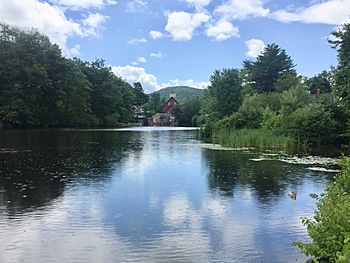Squam River facts for kids
Quick facts for kids Squam River |
|
|---|---|

The Squam River approaching the mill in Ashland, NH
|
|
| Country | United States |
| State | New Hampshire |
| Counties | Grafton, Belknap |
| Towns | Ashland, New Hampton |
| Physical characteristics | |
| Main source | Little Squam Lake Ashland 570 ft (170 m) 43°43′7″N 71°37′7″W / 43.71861°N 71.61861°W |
| River mouth | Pemigewasset River New Hampton 450 ft (140 m) 43°40′59″N 71°38′54″W / 43.68306°N 71.64833°W |
| Length | 3.6 mi (5.8 km) |
| Basin features | |
| Tributaries |
|
The Squam River is a short river in central New Hampshire, United States. It is about 3.6 miles (5.8 kilometers) long. This river flows out of Squam Lake, which is the second-largest lake in New Hampshire. The Squam River is a smaller river that flows into the Pemigewasset River. The Pemigewasset River then joins the Merrimack River.
Where Does the Squam River Flow?
The Squam River starts in Holderness, New Hampshire. It begins as a narrow channel between Squam Lake and Little Squam Lake. These two lakes are at the same height because of a dam. This means the river in Holderness does not flow freely.
The River's Journey Through Ashland
After Little Squam Lake, the river flows south for over a mile. It then reaches a dam that controls the water level of both lakes. Below this dam, the river quickly enters the area behind a mill dam in Ashland.
In Ashland, the river drops about 50 feet (15 meters) in just 0.2 miles (0.3 kilometers). This big drop was very important in the 1800s. It provided a lot of power for factories and businesses in Ashland. This helped the town grow a lot.
Meeting the Pemigewasset River
After flowing through the center of Ashland, the Squam River continues southeast. It goes under railroad tracks and Interstate 93. It also flows past the town's water treatment plant. Finally, the Squam River joins the Pemigewasset River. This happens in the northwest part of New Hampton.



